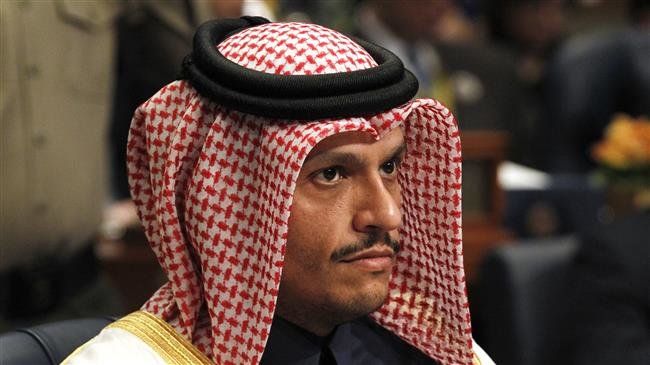Minister appears to accept that row between the two is fuelling other disputes in Middle East
Originally published on The Guardian website, by Patrick Wintour, 10 June 2019
Saudi Arabia is a force for disruption across the Middle East and Africa and often uses blackmail and economic pressure to enforce its brand of authoritarian rule, Qatar’s foreign minister has alleged.
In recent weeks the Saudis and Emiratis have been accused of interfering to stifle popular movements in Sudan, Libya and Somalia.
In a briefing in London, Mohammed bin Abdulrahman al-Thani appeared to accept that an unresolved two-year quarrel between Qatar and Saudi Arabia was starting to fuel other disputes across the region, making those disputes more difficult to resolve. Saudi Arabia, along with the UAE, Bahrain and Egypt, launched an economic and political boycott of the gas-rich Qatar two years ago, partly in objection to the Qataris’ foreign policy, including alleged support for the Muslim Brotherhood.
At the briefing, the foreign minister acknowledged the dispute was spilling over across the region, citing Libya and Somalia as two countries in which the Saudis have been determined to install regimes sympathetic to Riyadh.
“Qatar has been subject to a lot of efforts mainly led by Saudi and the UAE to demonise us,” Thani said. “Some of the countries, especially in the need for support of the Saudis and the UAE, have even been blackmailed to follow the same policy against Qatar. It creates a lot of instability in the Horn of Africa and the sub-Saharan area. Mainly the focus has been Africa, but there have been attempts elsewhere. Africa has been the focus because many of the countries are in need of help and support.”
He added: “They try with everybody – in some places they succeed to a certain level, some succeed 100% and some have failed.”
With the Saudis and the Emiratis presenting themselves as bulwarks of stability and a force against terrorism, Thani challenged their definitions, saying political stability comes through inclusion. “Any country that is not led by an authoritarian, they see as terrorists,” he said. “A terrorist can include anyone who disagrees with them.”
He said Saudi foreign policy in the past three years had led to “nothing positive” in Lebanon, Libya or Yemen.
Without directly accusing the Sudanese military of being under Riyadh’s instruction, Thani said “a brutal massacre” had occurred in the country last week, describing Sudan as crucial for the whole region.
In Somalia, the government had been subject to Saudi blackmail, he said, after it refused to sever links with Qatar.
The issue of the original Qatar-Saudi dispute, and how it may be spilling into other countries, is likely to be the subject of discussion between the Emir of Qatar and Donald Trump when the two leaders meet in Washington next month. Trump is close to the Saudi leadership, but there is a growing mood in Congress pressing his administration to be more critical of Saudi foreign policy.
The foreign minister added that Qatar was willing to join the group of mediators trying to prevent a conflict between Iran and the US, but said he believed Iran would not sit down with the US until economic sanctions were lifted.
Thani said: “At some point there should be an engagement. It cannot last for ever. If neither party is willing to engage in further escalation, both parties need to come up with some ideas to open the doors. We have to be active in advocating that.”
Qatar, which has a vast US military base from which a US attack on Iran may be mounted, disagrees with Trump’s policy on Iran, but is desperate to avoid a confrontation between the two which it fears will be an existential threat to the region.
Thani also said Qatar was willing to support any plan to end the Israel-Palestinian conflict, but only if it had the agreement of the Palestinians.
Link to the original post: https://www.theguardian.com/world/2019/jun/10/qatari-official-accuses-saudis-of-blackmail-and-destabilising-the-region


